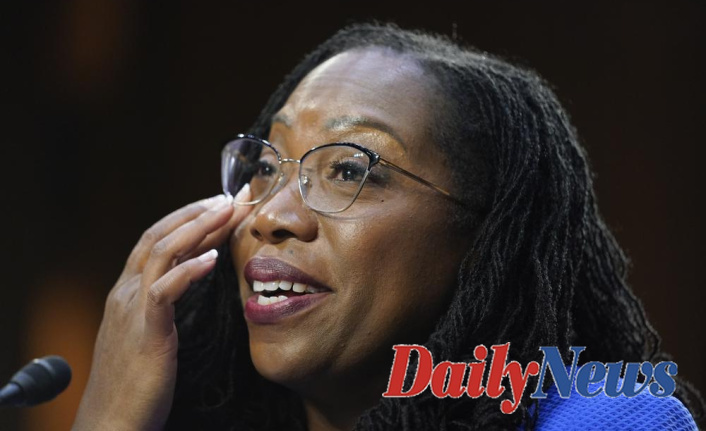Her history-making attempt to join the Supreme Court diverged from high-level constitutional questions to attacks against her motivations.
She declared that she would be the first Black female justice on the high court and said so "without any agendas" in her last day of Senate questioning . Republican attempts to portray her as softened on crime during her decade as a federal judge rejected. Legal experts from both sides will speak out on Thursday, the last day of hearings.
Although her approval appears all but certain -- Democrats want to vote before Easter -- Republicans tried to chip away Wednesday at her record.
However, the GOP criticism was punctuated by effusive praise from Democrats and reflections on her historic nomination -- none more riveting than New Jersey Senator Cory Booker. He used his time to not ask questions, but to speak and draw tearful eyes from Jackson.
Booker, who is Black, stated that he can see "my ancestors" and "yours" when he gazes at her. He said, "I understand what it took for you to sit here at this table." "You've earned this place."
Jackson sat silently as Booker spoke, but she began to cry, with her family behind her.
After receiving similar praises from Sen. Alex Padilla she was again in tears and told the California Democrat that she hoped to inspire others by saying, "I love this country because I love law."
In two days of hearings that lasted more than 22 hours, GOP senators aggressively interrogated her about the sentences she handed to child pornography offender in her nine-year tenure as a federal judge. They also asked her about her views on critical race theory, her legal advocacy for terror suspects at Guantanamo bay, and her religious beliefs.
Jackson responded to questions about an affirmative action case at Harvard University. She is currently on the Board of Overseers. When Ted Cruz, a Texas senator, asked Jackson about the matter, she replied that it was her plan.
The court will hear challenges to college admissions in the fall from Asian American applicants to Harvard (a private institution) and to the University of North Carolina (a state school). Although the court plans to hear both suits against the schools together, it could also separate them to give Jackson an opportunity to participate in one of the most important issues next term.
As they did on Tuesday, Republicans spent Wednesday focusing on her sentencing, especially on the child pornography cases. As the day progressed, tempers rose. Senator Judiciary Committee Chairman Dick Durbin was seen lowering his gavel when Cruz refused to give up his time while Jackson was being questioned.
Cruz snapped, shouting "You can bang the thing as long as it takes," and he wanted Jackson to answer his question.
Durbin replied, "At some point, you have to obey the rules."
South Carolina Senator Lindsey Graham questioned Jackson about the appropriate punishment for child pornography convicted. Graham, like Cruz and other members of the committee, said that she was too soft on these criminals. Graham interrupted her often as she answered. At one point, he suggested that judges should just "put their a–- in jail!"
Sentences were a part of a wider effort by several potential presidential candidates, including the Republicans on the committee, to describe Jackson's record and her judicial philosophy as too soft on the most serious criminals. This was also indicative of the growing emphasis on crime in GOP's midterm elections.
Thom Tillis, North Carolina senator, told Jackson that she was very kind to her and that there is at least an element of empathy in the way you treat a defendant. Some might consider this more than what many of us are comfortable with when it comes to justice administration.
Jackson's record was the focus of much of the attention. This suggests that Jackson's confirmation vote in full Senate is unlikely, contrary to Democratic hopes. Several Republicans still acknowledged that Jackson is likely to serve on the court. Democrats can confirm her with no bipartisan support from the 50-50 Senate, as Vice President Kamala Harris is able to cast the tiebreaking vote.
Jackson was supported by the Democrats on the committee. She stated that the Republicans were mischaracterizing Jackson's decisions. On Tuesday, she said to the committee: "Nothing could possibly be further from truth."
She stated that she bases sentences not only on federal guidelines but on many other factors. She said that sentencing is not a "numbers-game", noting that there are not mandatory sentences for sex offenders, and that there has been a lot of debate about the subject.
She said that some of the cases gave her nightmares and were "among my worst ever seen."
Jackson stated that Jackson will confirm her nomination and "rule from a neutral position, to examine the facts and circumstances of each case without any agendas or push the law in any direction."
She reminded the committee of her uncle and brother who were police officers. "Crime and its effect on the community, as well as the need to enforce law enforcement -- these are not abstract concepts or slogans to me."
In February, President Joe Biden selected Jackson to fill a campaign promise to nominate a Black woman for the Supreme Court. She will take the seat of Justice Stephen Breyer. He announced in January that he would be retiring this summer after 28-years.
Jackson would become the third Black justice after Thurgood Marshall, Clarence Thomas and Clarence Thomas and the sixth woman. Her confirmation would keep the court's current conservative majority of 6-3. Her confirmation would make her the first ex-public defender to the court and the first justice to have experience representing indigent criminal defendants, since Marshall.
The potential GOP presidential candidates Cruz, Missouri Sen. Josh Hawley, and Arkansas Sen. Tom Cotton were some of the most aggressive questioners during the hearings. All of the potential GOP presidential candidates touched on issues that are popular with their base. They also attacked critical race theory and the notion that racism is a systemic problem in our institutions. Jackson stated that the idea does not come up in Jackson's work as a judge and "wouldn't" be something she would rely upon if confirmed.
Jackson was asked about abortion and readily agreed to make comments about the landmark cases that conservative Justices Amy Coney Barrett (and Brett Kavanaugh) made when they were up in confirmation. "Roe & Casey are the established law of the Supreme Court regarding the right to terminate a woman’s pregnancy. Jackson stated that they have created a framework which the court has confirmed."
The court is still considering whether to rule in favor of cases affirming a nationwide right for abortion.
At the end of Tuesday's lengthy hearing, Senator John Kennedy, R.La., asked Jackson when her life began. He asked her if she knew and she replied that she did not know. She then added that Jackson does not have a religious belief that she accepts when she is deciding cases.
Democrats were critical of the Republicans' questioning, but praised Jackson's handling of it after Wednesday's session.
Durbin stated to reporters that it was a bitter pill for some who oppose her to accept this type of change in America.












